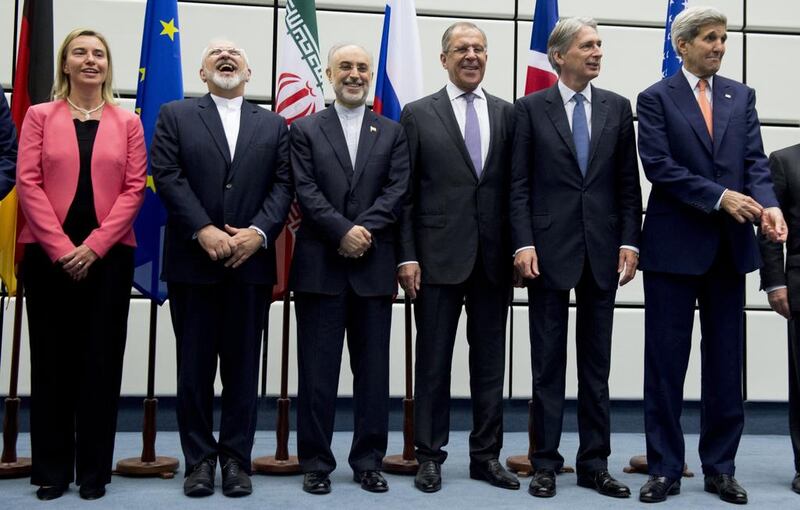The deal reached on Tuesday between Iran and six major powers to restrict Tehran’s nuclear capability in return for sanctions relief has dominated the Arabic language press.
In the Jordanian daily Addustour, Oraib Al Rantawi said the first impression of US president Barack Obama and his Iranian counterpart, Hassan Rouhani, as they announced their respective “achievements” in Vienna was to think one had inflicted a crushing defeat on the other.
When each side described the deal as “good” and “historic” and that “this is the deal that we wanted”, the two presidents were in fact addressing their opponents at home.
Expecting heated debates in Congress, Mr Obama said he would veto any attempts to block it and warned that the alternatives were catastrophic. Mr Rouhani warned his opponents against telling lies to deal a blow to the Iranians’ aspirations for a looming prosperity.
He said the Vienna agreement has granted each president what he needed to sell the deal.
Iranian foreign minister Mohammad Javad Zarif said the accord was a “win-win agreement” but was also realistic when he said that the deal was not the best for either party, but it has secured each side’s minimum goals.
President Obama said that Iran was an intelligent rival, which is perhaps what Tehran has been trying to prove during the 12-year standoff.
Mr Al Rantawi described Mr Zarif’s impressive skills in negotiating as an equal with the major powers, showing steadfastness and intelligence – skills that the writer said were sadly lacking in the Arab world.
In the London-based daily Al Hayat, Ghassan Charbel said the Arabs have no reason to be surprised a deal was reached because it was clear both sides were willing to clinch it.
President Obama has been longing for a deal since he became president and Iran did not want to miss the Obama opportunity.
A third man indirectly helped them reach a deal: Abu Bakr Al Baghdadi, he said.
ISIL’s rise in Syria and Iraq boosted US-Iran talks and forced Tehran and its proxies to wage an existential war, one that will be paramount to getting the agreement through the US Congress.
While media outlets lauded the agreement as “historic”, Israel seemed to be bracing itself for the Congressional battle and slammed the accord as a “historic mistake”.
A careful examination of the deal shows neither side can claim a “resounding victory” or a “surrender deal”. The agreement showed lessons had been learnt from the past and the importance of mutual concessions.
Iran’s supreme leader came to the conclusion that the “death to America” chants will not alleviate people’s sufferings from the sanctions and that Iran cannot become a normal state in the international fold without US consent.
For his part, Mr Obama, in his efforts to normalise relations with long-time adversaries such as Cuba and Iran, made sure he offered Iran a chance for negotiations as a way to lift the sanctions.
With this deal, Iran won recognition that it is practically capable of producing a nuclear bomb, but like Germany, Japan and Brazil, it is refraining from doing so, Mr Charbel wrote.
He noted that the negotiations occurred without the direct participation of Iran’s neighbours – namely Turkey and GCC countries – in contrast to the nuclear talks with North Korea which were attended by China, Japan, and South Korea.
For countries of this region, Iran’s regional policies are a headache that is more pressing than its nuclear ambitions, but the reverse is true for the major world powers.
If the countries of this region want to avoid the bad aspects of the nuclear deal, the three heavyweights – Saudi Arabia, Egypt and Turkey – must work together.
The London-based Al Quds Al Arabi’s editorial said the news of the deal being agreed was a “tough moment” for Arab countries.
The first implication of the new agreement is that Iran achieved strategic deterrence without having to make a nuclear bomb or import ballistic missiles.
Second, the US has practically abandoned the Arab countries as strategic allies because it decided to make a deal with a country it accuses of supporting terror.
This gave Iran privileges in the region in exchange for preventing Arab countries from catching up to it, thus keeping them in need of US protection.
The third implication is that Iran must display political responsibility in line with its new regional status, instead of boasting the number of Arab capitals under its control.
This will mean it has to extend its hand to its Arab and Islamic neighbours to bridge the huge gap between them.
Translated by Abdelhafid Ezzouitni
aezzouitni@thenational.ae





